Are you on the hunt for a stylish and space-efficient coffee table to add to your living room? Well, a round coffee table might just be the ideal fit for you. But before you jump right into buying or building one, there are a few things you need to consider. How big should it be? How can you arrange the seating around it? And if you’re thinking of building it yourself, what’s the best design for DIY newbies? Don’t worry; we’ve got you covered. In this article, we’ll guide you through everything you need to know so you can confidently choose, build, or buy the perfect centerpiece for your living room. Let’s get started!
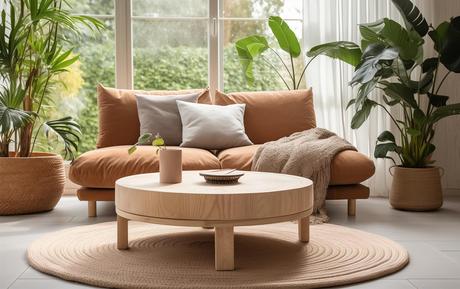
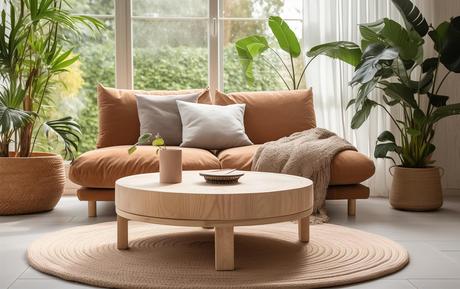
Photo by Pamanumas from Freepik
Quick Insight – When selecting a table for your space, choosing a style that complements your decor is essential. For a modern look, consider round tables made of glass or metal. If your preference leans more toward traditional aesthetics, wooden table styles may be a better fit.
How to Make a Round Coffee Table From Scratch
So you want to build your own round coffee table? Great idea! Here are the basic steps:
Gather Your Supplies
To build the tabletop and legs, gather the following materials: wood boards, wood glue, nails or wood screws, and essential tools like a saw, drill/driver, sander, and clamps. When it comes to the tabletop, opt for sturdy hardwood such as oak, maple, or teak. As for the legs, you can either use the same wood or a cost-effective alternative like pine.
Related Article: 22 Teak Coffee Table Ideas for an Eco-Friendly and Elegant Interior
Cut the Tabletop to Size
Determine the size you desire for your tabletop and execute a precise cut of a circular piece of wood accordingly. Ensure to sand the edges and surface meticulously to attain a smooth finish.
Attach the Legs
Firstly, cut four legs to your desired height – a typical coffee table would require legs around 16 to 18 inches in length. Then, position the legs evenly around the underside of the tabletop, and attach them with glue and nails or screws driven in at an angle for maximum strength. Finally, make sure to wipe away any excess wood glue with a damp cloth.
Add Braces (Optional)
To ensure maximum stability, you can take it one step further and attach wooden braces between the legs. Cut two additional boards to fit precisely between opposing legs, and then securely glue and nail them in place.
Apply a Sealant (Optional)
To safeguard the wood or alter its hue, it is imperative that you apply a sealant, such as polyurethane or wood stain. It is essential to follow the directions precisely and apply 2-3 coats, ensuring that each coat is allowed to dry completely before applying the next.
If you want a unique table, build it yourself! With patience and effort, you can create a stunning piece tailored specifically to your tastes. Whether you choose to shape it, stain it, or leave it natural, your handcrafted masterpiece is sure to impress. Don’t settle for a mass-produced table – take control of your decor and build something truly special!
Gain Insight: Sand, Stain, Seal: A Guide On How to Refinish A Coffee Table
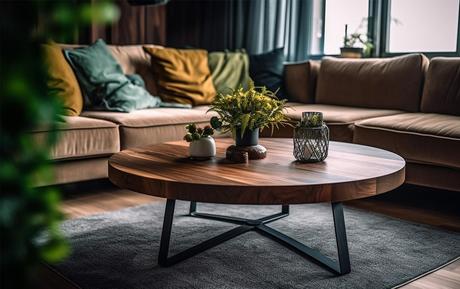
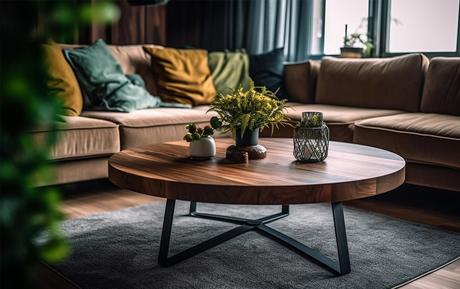
Photo by IamMujahidMalik from Freepik
Quick Insight – A plain round table can be more aesthetic by adding decorative bases, inlays, or metal accents. Don’t settle for a boring table when you can easily elevate its design with these simple touches.
When to Use a Round Coffee Table in Your Living Room
A round coffee table is ideal for more open living room layouts or spaces where traffic flows in many directions. The circular shape makes it easy for people to maneuver around the table without bumping into corners.
More Info: 20 Fresh Takes on Invigorate the Versatile Round Coffee Table
Size Matters
Size is key when choosing a coffee table for your living room. As a general rule of thumb, look for a table 2/3 the length of your sofa. So, if you have a 6-foot sofa, a 4-foot round table is an ideal choice. This leaves enough space for people to walk around the table while still being close enough to reach drinks, remotes, etc.
For larger living rooms, don’t be afraid to size up. A 50-inch or 60-inch round table can make a lovely centerpiece in an open-concept space. Just make sure to leave at least a 3-foot walkway behind the sofa for easy circulation. On the other hand, for small living rooms, a nesting coffee table (a smaller round table inside a larger one) or a 30 to 36-inch table is ideal.
Read More: A Cluster of Innovation: 15 Nesting Coffee Table Ideas
Maximizing Use
A round coffee table offers more usable surface area than a square table of the same size. This makes it easier to arrange decor, books, plants, and knickknacks on top in an artful way. When entertaining, a large table doubles as a perfect spot for displaying appetizers, desserts, or a cheese board.
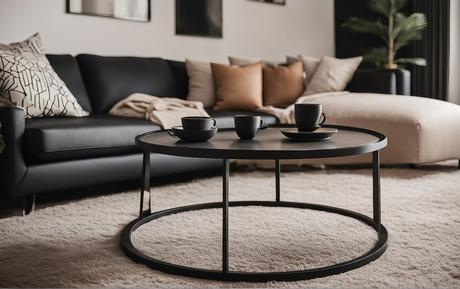
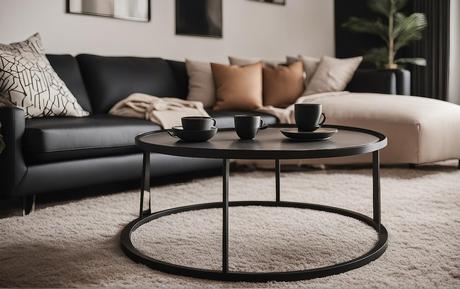
Photo by ArtisticLens from Freepik
Quick Insight – To maximize surface area and add visual interest, opting for a tiered or multi-level round table is a great idea. This way, you can also display different decorative items on each level.
How Big Should a Round Coffee Table Be?
The size of your coffee table is essential for aesthetics and function. You want a table that complements your space and provides enough surface area for your needs.
Measure Your Space
First, measure your living room or seating area where you plan to place the table. Make note of the shape and layout of your furniture, entryways, and walkways. Then, measure the open space in the center of your arrangement where you envision the table. For the most versatile size, look for a table with a diameter of 1/2 to 2/3 the width of your open space.
A smaller table around 36 to 42 inches in diameter works well for a cozy seating area with a loveseat and two chairs. For a standard sofa and loveseat setup, consider a medium 48 to 54-inch size. If you have an open-concept living room or want extra table surface, a large 60-inch or bigger is a great option. However, leave enough space around the edges for walking and avoid crowding the table with too much decor.
Consider Your Needs
Think about how you will use the table. If you just need a spot for a few coffee mugs and remotes, a smaller table will do, whereas a bigger table provides a more surface area for entertaining large families and get togethers. Choose a size with clearance if you want space for coffee table books, trays, bowls, or ottomans under the table.
The height of your table also depends on its purpose. A table around 16 to 18 inches high is typical for a coffee table and works with most standard sofa and chair seat heights. For a casual family space, a lower 14 to 16-inch table makes it easy for little ones and pets to navigate around. If you want a table for dining or desk use, consider a counter-height table around 36 inches high.
By measuring your space, determining how you’ll use the table, and keeping these size recommendations in mind, you’ll find a coffee table that is perfectly sized for your needs. The ideal table creates an attractive focal point in your living room that is stylish and highly functional.
Discover More: 22 White Round Coffee Table Ideas: A Fusion of Refined Simplicity
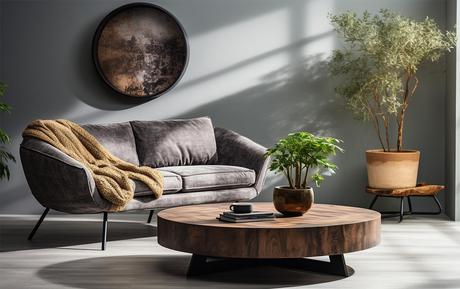
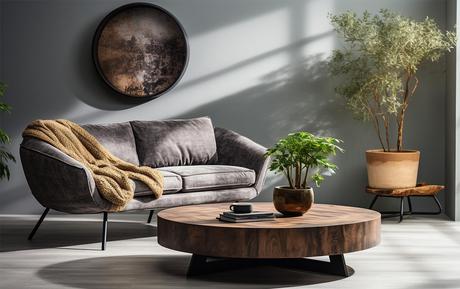
Photo by IamMujahidMalik from Freepik
The Pros and Cons of Owning a Round Coffee Table
Round tables offer practical benefits but also a few downsides to consider before purchasing one.
Space-efficient shape
The rounded shape maximizes usable surface area for its footprint. This is ideal for smaller living rooms or seating areas where every inch of space counts. The smooth, curved edges also make it easier to walk around and less likely to bump into.
Versatile style
A round coffee table boasts a classic and timeless shape that effortlessly complements most decor styles, from traditional to modern. Its simple yet captivating form serves as the focal point in a minimalist space or anchors a diverse mix of furnishings. The round shape also provides more flexibility in positioning, with no definite “front” or “back,” allowing you to place it center stage or offset to one side as per your preference.
Read More: 26 Round Wood Coffee Tables: A Classic Piece for Modern Homes
Limitations
While attractive and space-efficient, a round coffee table may not suit some needs as well as a square or rectangular table. For example, it typically offers less surface area for storage or displaying large items. The round shape can also make it trickier to fit in a corner or against a wall. It may take up more floor space for its top composition compared to a table with right angles.
A round coffee table can be a prominent choice, especially if you’re looking to maximize space or want a versatile, classic piece of furniture. But be sure to weigh the pros and cons for your own needs and room layout. When in doubt, you can never go wrong with a size and style that fits your space comfortably and suits your style.
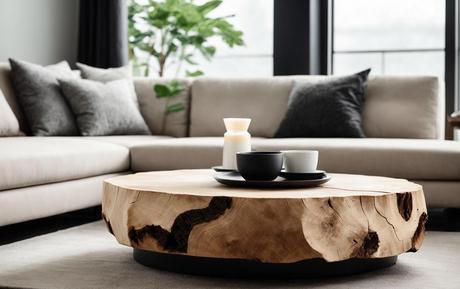
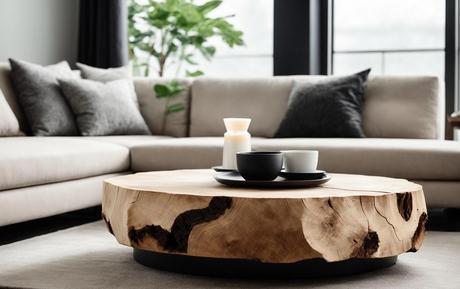
Photo by Anton_kor from Freepik
Quick Insight – Consider tables with drawers, open shelves, or a lift-top feature to maximize storage space. These versatile solutions are particularly beneficial in smaller interiors where storage is at a premium.
Final Thoughts
You’ve got it all – from building your own to finding the right size for your space, round coffee tables can be the perfect centerpiece for any living room. They offer a convenient spot for drinks, remotes, books, and decor. Apply the tips and tricks you’ve learned here to craft or purchase a table that suits your needs and ties your room together. After all the hard work, sit back, relax, and enjoy the results of your labor. You deserve a coffee table that caters to your needs and provides you with years of relaxation and conversation.

